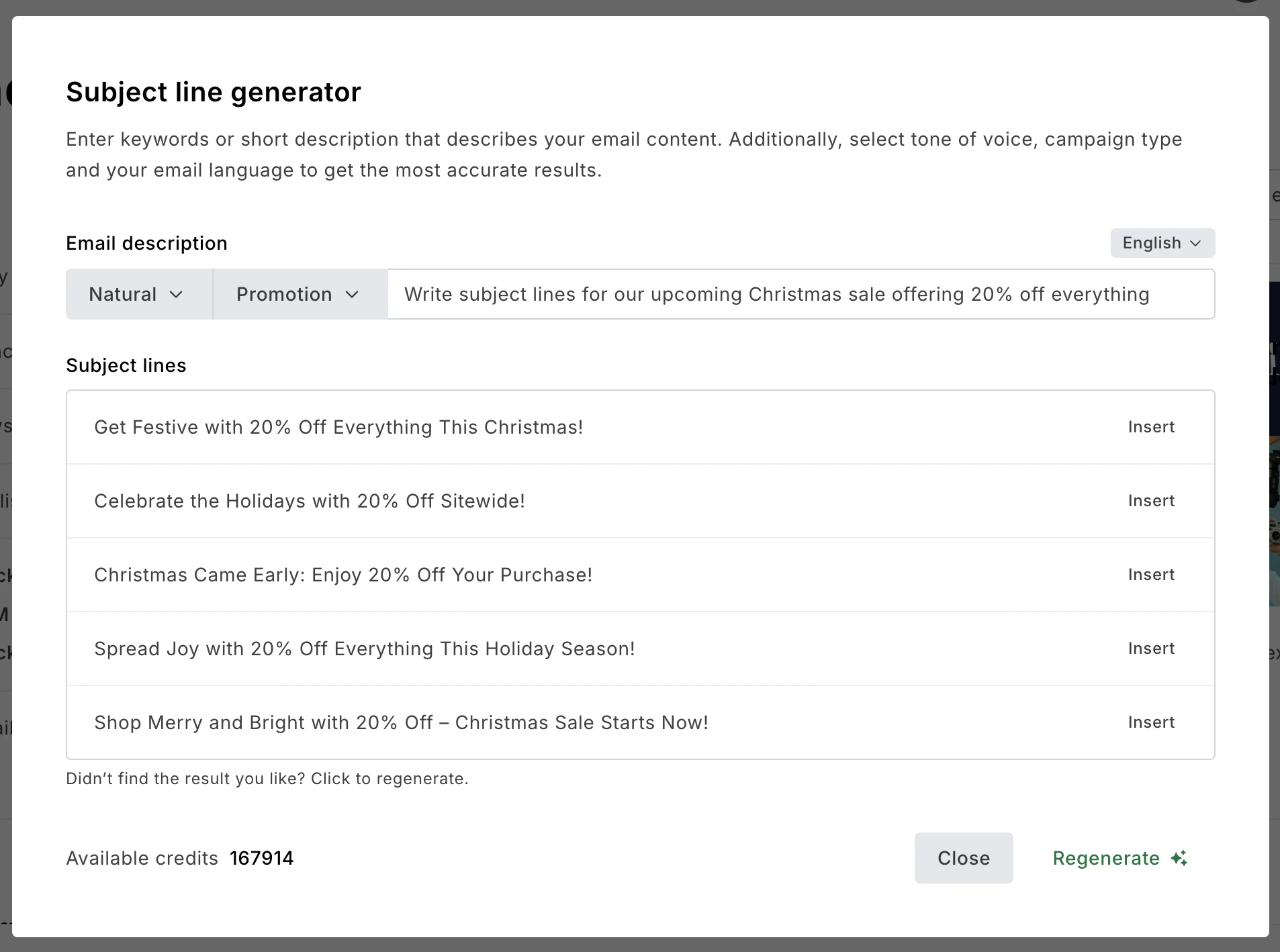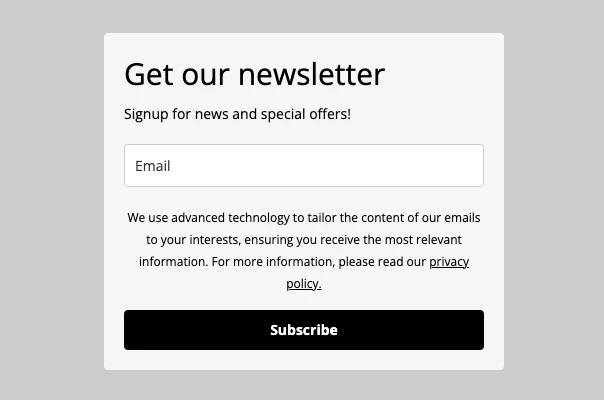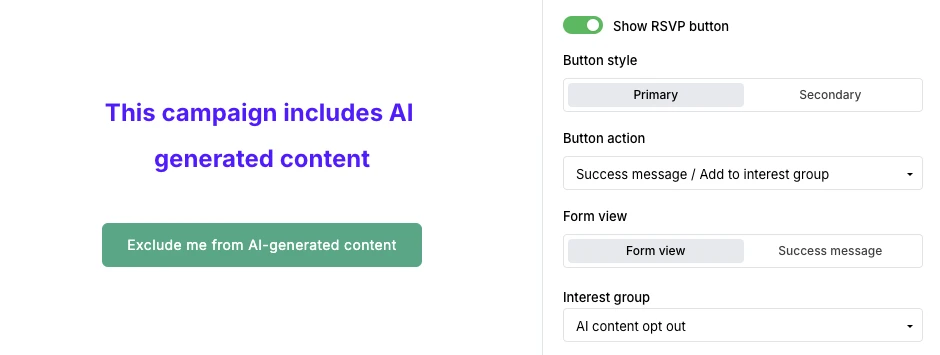Using AI in your email marketing? Here’s what it means from a legal perspective
 Creating compliant email campaigns with AI.
Creating compliant email campaigns with AI.
Artificial intelligence (AI) is changing how businesses approach email marketing, enabling new levels of personalization, efficiency, and engagement.
But, as AI becomes more integrated into marketing strategies, businesses need to navigate the legal landscape surrounding it.
This article explores the key legal considerations for using AI in email marketing, focusing on the new EU AI Act, GDPR compliance, ethical considerations, and what it means for your business and subscribers.
Plus, we end the article with a checklist of actions you can take to safely use AI in your email marketing.
This article is made available by MailerLite for educational purposes only and gives you general information and understanding of the law governing AI. It does not aim to provide specific legal advice. By reading this blog post, you understand that there is no attorney-client relationship between you and MailerLite. We strongly recommend consulting a lawyer to discuss the individual needs of your business.
The 2 main regulations that impact AI use
Let’s first look at the main regulations that impact AI use in email marketing: The EU AI Act and GDPR.
The EU AI Act relates to the EU. But the U.S., China, the UK, Japan, and Canada are all developing similar AI regulations. If you have a global audience, you must stay informed about these developments and be ready to adapt.
The EU AI Act classifies AI systems
The EU’s AI Act entered into force on August 1, 2024, and created a comprehensive legal framework for AI use that applies to organizations within the EU.
It impacts you if you’re based in the EU or have subscribers in the EU, and if you use AI or are considering using AI in your email marketing.
One of its key aspects is that it categorizes AI systems based on their level of risk, from minimal to unacceptable.
Unacceptable: Tools that manipulate behavior in harmful ways
High: Tools that significantly impact people's lives and require regulatory oversight
Limited: Systems like chatbots or product recommendation engines
Minimal or no risk: AI tools used for basic data analysis or to improve user experience without impacting an individual's rights
MailerLite’s AI features are considered limited risk since they present minimal risk to safety, rights, or society. The limited risk comes from the fact that text generation systems can produce false text with high confidence.
Users should be aware that they are interacting with an AI system, so MailerLite is responsible for ensuring compliance with transparency and data protection requirements.
GDPR impacts how you can use data
GDPR is one of the strictest data protection laws in the world. While it doesn’t target AI specifically, it does set clear rules on how businesses should handle the personal data of EU data subjects, which impacts how you use AI in your email marketing.
If GDPR applies to you, you must make sure that the way you use personal data, whether for traditional or AI-driven purposes, aligns with its requirements.
Here are the main 3 GDPR-compliant approaches to safely process personal data in your marketing efforts, including when using AI-generated content:
1. Choose the right lawful basis for data processing
There are several lawful bases for processing personal data under GDPR.
Consent: You need clear and explicit consent if you use data for highly personalized content, behavioral tracking, or analysis beyond what’s necessary to fulfill a service. Be transparent about how their data will be used, and provide opt-in options for AI features.
Contract fulfillment: If AI-generated content or features, such as sending tailored emails or optimizing delivery based on preferences, are directly necessary to fulfill the service your subscribers have signed up for, this can fall under contract fulfillment.
Legitimate interest: In some cases, you can process subscriber data without explicit consent if it serves a legitimate interest, such as fraud prevention or ensuring the security of your systems. For example, AI-driven tools might analyze behavioral patterns to detect suspicious activity or protect the integrity of your email campaigns. While consent isn’t required for these activities, we recommend conducting a legitimate interest assessment to document your grounds, demonstrate compliance with GDPR, and balance your business needs with subscriber rights.
Be clear in your Privacy Policy about how AI contributes to your email marketing. While not explicitly required, additional clarity builds trust.
Always allow subscribers to manage their preferences, including opting out of AI-driven features if they choose.
2. Allow subscribers to manage their email marketing preferences
Subscribers must be able to manage their email marketing preferences, including opting out of certain AI-driven features if they choose. This gives your subscribers control over their experience and helps you maintain transparency and trust.
3. Be transparent with your subscribers
Subscribers should always know how AI is influencing the emails they receive. This keeps you compliant with GDPR and helps build trust with your audience.
By being upfront about your use of AI, you show your customers that you respect their privacy and are committed to using their data responsibly.
Guidelines for using MailerLite’s AI features
MailerLite’s AI features currently include its subject line generator, email text generator, landing page image generator, and Smart sending.
Because MailerLite’s AI tools are used in a way that aligns with the original purpose for which consent was given, like creating newsletter content or personalizing marketing emails, you don’t need separate consent to use the tools.

But, there are steps you should take to ensure your AI use is done in a way that aligns with global regulations.
Following these guidelines helps you safely use MailerLite’s AI tools to enhance your email marketing campaigns, build stronger relationships with your subscribers, and stay ahead of the regulatory curve.
1. Use AI tools with human oversight
MailerLite’s AI tools can handle a lot of the heavy lifting in your email marketing, such as creating content or optimizing send times. But it’s still important to track how the tools are working to ensure that AI operates fairly and ethically.
For example, MailerLite’s AI email writer helps you create written content for your campaigns. However, AI content can hallucinate and make factual errors.
Having a human check the AI-generated output and edit it when necessary ensures that the content they receive is accurate and high quality.
2. Update your privacy policy
Update your Privacy Policy to clearly explain how you use AI to process personal data. Include the following text or something similar.
“We use advanced technology, like AI, to tailor the content of our emails to your interests, ensuring you receive the most relevant information.”
For even more transparency, you could make your AI use clear to your subscribers by adding a note to your emails or forms, as in the example below.

If you use other AI tools in addition to MailerLite, you may also need to add information about these services to your privacy policy.
You could even create a separate AI policy, this will help you stand out and communicate your ethical stance on AI usage to your subscribers.
3. Allow subscribers to manage their preferences
You might need to let users opt out of AI content if your use of AI goes against what the subscriber agreed to when they joined your newsletter.
Here are some examples of when you should let your subscribers opt out of your AI-powered content:
Content scope change: Offer an opt-out if the AI-generated emails include topics outside what subscribers initially agreed to or if you send them at a higher frequency
Increased personalization: If deeper personalization or behavioral data is used beyond what subscribers expected when they joined your list, include an opt-out option
Legal compliance: Make it easy for people to opt out if privacy laws in their region require that subscribers can control AI-driven data use
Content fatigue: Let people opt out if frequent or unexpected AI-driven content risks leading to content fatigue. This will help you maintain trust and engagement
Make the opt-out process easy by including the option in your preference center and linking to this in your email.
Alternatively, use our event block to add a button to your email that automatically adds people who click on it to an AI content exclusion group.

4. Minimize your data use
Using only necessary data is not just a legal requirement under GDPR and other privacy regulations but also an ethical one.
MailerLite's AI tools process your existing subscriber data to personalize and optimize your emails. The tools don’t require or result in the collection of additional data, which complies with the requirement of minimizing data use.
If you use other AI tools, you’ll have to check that they also only collect necessary data that the user has opted in to provide.
Using customer data responsibly and in a way that aligns with the original purposes for which your subscribers gave their consent helps maintain the trust of your subscribers.
5. Be aware of intellectual property laws
MailerLite’s AI tools can create custom emails, images, and other marketing materials to incorporate into your campaigns.
Just be aware that in some jurisdictions, such as the U.S., AI-generated works cannot be owned in the same way as human-created works.
If you’re using MailerLite’s AI-based feature to generate email content, it is a good practice, but not mandatory to include a note in your Privacy Policy or email footer explaining how this relates to intellectual property.
“We use AI tools to create personalized content for our emails. While these tools help us deliver relevant content to you, please note that AI-generated content may not be subject to the same intellectual property protections as human-created content.”
You should also check the images and text created by AI to ensure they don’t infringe on the intellectual property of others. For example, generated images might include logos or likenesses that you need permission to use.
Before hitting send, ensure that you have the right to modify and distribute the content the tools produce.
What else can you do to stay ahead?
The AI Pact is a voluntary agreement initiated by the European Commission to encourage companies to prepare to meet the AI Act requirements in advance (more information here).
These regulations are related to how you use AI across your business, rather than specifically targeting email.
Here are several recommended steps you can take to align your AI use with the AI Pact and broader regulatory frameworks like GDPR and the EU AI Act:
Adopt early an AI governance strategy: Set internal guidelines for ethical AI use, implement oversight mechanisms, and ensure that your practices are in line with regulatory standards.
Map out AI systems and processes: Make note of all the ways you use AI in your business. This should cover everything from data collection to content personalization and campaign delivery. Mapping these systems helps you pinpoint areas of compliance risk and ensure that AI is used ethically and effectively throughout your workflows.
Train your team on how AI operates, its ethical implications, and the legal requirements such as GDPR and the EU AI Act. This ensures that your team is equipped to handle AI responsibly and in full compliance with current laws.
Regularly reviewing how AI is being used in your business will help you stay compliant and quickly address any potential issues.
Compliance checklist when using AI features
We know that there is a lot of information to keep in mind when you use AI features in your email marketing.
Here's a checklist to help you stay compliant with the EU AI Act, the AI Pact, and the GDPR and maintain a relationship built on trust with your subscribers.
Disclose AI usage: Inform subscribers how AI is used in your email marketing, through multiple channels, including your Privacy Policy, consent forms, and optionally in email footers or the preferences center. For example, mention that your email marketing service provider MailerLite uses AI tools, more information can be found in MailerLite’s Privacy Policy.
Offer opt-out options: Allow subscribers to opt out of AI-driven features through an “AI Exclusion Group” or similar feature.
Identify lawful basis: Ensure that you have clear legal grounds for processing subscriber data.
Limited data collection: Only collect and process the data necessary for your determined purpose, which aligns with GDPR principles.
Ensure compliance and oversight: Review AI-generated content before use to ensure compliance with your business vision, and legal and ethical standards.
Conduct regular audits: Regularly audit AI usage to ensure it complies with relevant laws and ethical guidelines.
Build subscribers' trust: Educate subscribers about how AI is used in your campaigns and offer clear data preferences. Provide transparent explanations, through FAQs or blog posts, on how AI enhances their experience.
Adopt an AI governance strategy: Establish internal guidelines and frameworks to govern how AI is implemented, monitored, and maintained.
Provide staff training: Ensure your team is trained on AI ethics, compliance with relevant regulations like GDPR and AI Act, and how to responsibly use AI in marketing.
This means regularly reviewing legal updates, engaging in industry discussions, and consulting with legal experts.
Additionally, the AI regulatory landscape is changing rapidly. Try to stay informed about these developments and be ready to adapt when necessary.
Do you have questions about responsible AI in email marketing? Let me know in the comments, I’m available to answer any questions.
